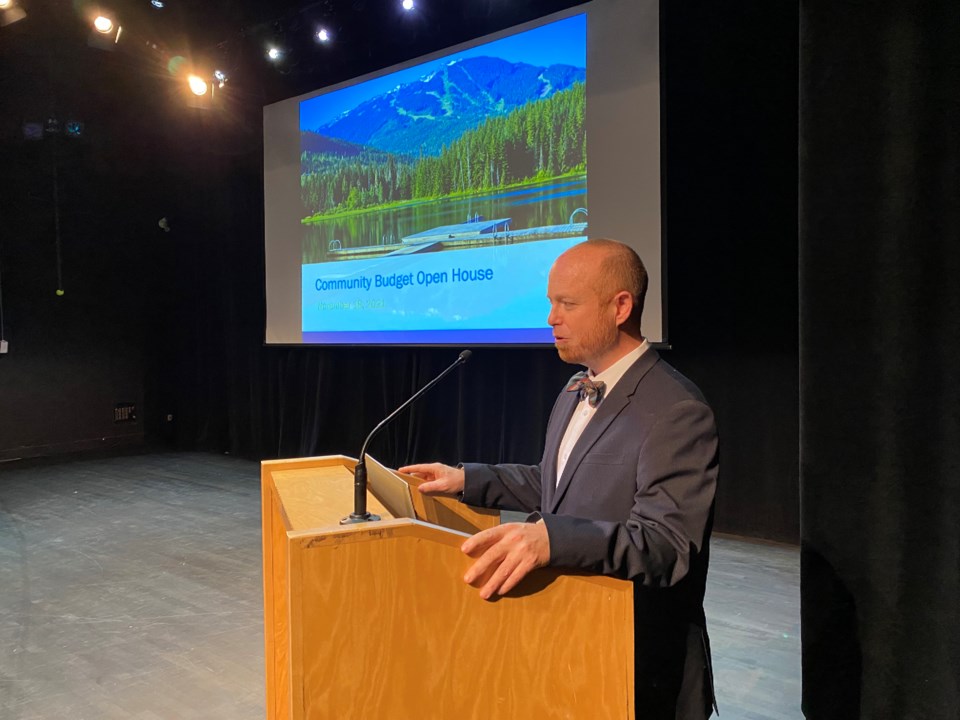The Resort Municipality of Whistler (RMOW) is proposing a 6.72-per-cent tax increase in 2022, as well as three-per-cent increases to sewer, water and solid waste fees.
The higher proposed tax increase in 2022 comes after council reversed course on a 4.89-per-cent increase in 2021, opting instead for an increase of 1.08 per cent.
The municipality under-contributed to its reserves in 2021 to help bridge the gap between operating revenues—severely hampered by COVID-19—and spending in 2021, and starting in 2022, will not only need to make up the lost contribution, but account for ongoing works and services in the community, said director of finance Carlee Price at a budget information session at the Maury Young Arts Centre on Nov. 18.
“Part of the reason we were able to offer tax relief to ratepayers in 2020 is because we had a healthy operating reserve balance. Rebuilding that operating reserve is critical to funding any unforeseen circumstances that may emerge in the future,” Price said.
“Whether that’s fire, whether that’s a flood, whether that’s a pandemic, having that money in the reserves at the time those disasters strike is critical to this community and something that’s worth a good deal of our attention.”
As in every year, the tax increase will impact households differently.
In an example provided by the RMOW, a property assessed at $1.5 million could expect to see an increase in property taxes of $155 next year, while one assessed at $4 million might see an increase of $415.
“The tax rate increase that is proposed applies to the total tax pool. Allocation of those amounts to individual properties depends on the value of those properties,” Price said.
“The year-over-year change on an individual property depends on the relative change in valuation of that property versus the community.”
The average expected increase in assessed value for residential properties in Whistler is currently estimated at 30 per cent, so “any property in this community that appreciates by less than 30 per cent for the 2022 tax year will see a significantly lower increase in their property tax bill than the announced rate,” Price added.
In her presentation, Price pointed out that over the past 10 years, Whistler has increased taxes by 1.71 per cent annually on average—below the three-per-cent average set by comparable communities in the Lower Mainland.
“The question we need to ask is, at what point does a commitment to low tax increases overshoot the mark?” she said.
“What are the consequences of another 10 years of low tax increases, and is it time to think in new ways about resourcing and funding the work that is both necessary and essential to maintain the vibrancy of this community going forward?
“So while we were sure that the response to the 6.72 per cent might be ‘alarmed,’ we want to encourage folks to think of this in a multi-year period, and to think of the importance, again, of maintaining the vibrancy of this community, and rising to the challenges that we face today, perhaps not what we faced 10 years ago.”
Those in Whistler Housing Authority properties will likely see no change or a decrease, due to the assessed value of other properties in Whistler seeing a higher increase, according to the RMOW.
The change to sewer, water and solid waste fees will amount to about a $36.15 increase for all properties.
The total proposed project spend in 2022 is $45.7 million—down from $54.9 million in the 2021 budget (though that figure was inflated by a $10-million investment in employee housing in Cheakamus Crossing).
The proposed spend covers 144 proposed projects in 2022, the bulk of which is directed at infrastructure services ($24.3 million) and resort experience ($9.7 million).
Key areas of focus for 2022 include (but are not limited to): tourism recovery, affordable housing, reducing permit wait times, rebuilding transit ridership, water quality and delivery, waste reduction and wildfire protection.
“Part of the budget considerations look at removing barriers for economic recovery, so that includes making improvements to customer service, [and] catching up on projects that were delayed as part of the recovery response because we had reduced staffing levels and other considerations,” said chief administrative officer Virginia Cullen.
“We know that we have increased stress on our parks, and we have not let the foot off the gas in terms of affordable housing, [which] will remain a really important focus going forward.”
All of the RMOW’s budget work is also “underlined” by implementation of the Climate Action Big Moves Strategy, Cullen added.
“On all of our projects there are climate considerations,” she said. “It is considered with everything that we are doing.”
The RMOW is using new online platforms to allow residents to review content, ask questions and receive answers, as well as share their ideas and feedback—the new platforms will be live at whistler.ca/budget beginning Nov. 19.
All budget documents are available to view in full online, and an online engagement portal is available at whistler.ca/budget until Tuesday, Dec. 7 at 5 p.m.
Questions and comments can also be emailed directly to [email protected]
Pick up next week’s Pique for more on the 2022 budget.



-2.jpg;w=120;h=80;mode=crop)

-2.jpg;w=120;h=80;mode=crop)
.jpg;w=120;h=80;mode=crop)